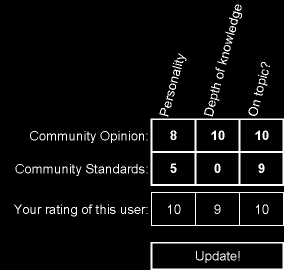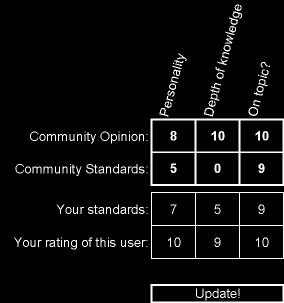Moderating Online Chat Rooms
By ai-depot | October 24, 2002
Moderation with Complex Systems
Moderating Message Boards with Complex Systems
Complex system theory can easily be adapted to the moderation of online message boards. All of the basic elements are there or can be easily programmed in. To begin with, there is a huge pool of pubic opinion to draw from. “More is different;” even though some individuals may regress towards trolling and flaming, the majority of people come to message boards to share ideas. If it is possible to draw upon popular public opinion of what is acceptable or not acceptable behavior on a message board, then the first step will be complete. To do this Webmasters have to give a voice to their patrons. They have to allow for a rating system of fellow users. Some websites already have such rating systems in place, calling them “karma” systems (Edge, 2000). You can give users “karma” points to affect their overall karma score. One might give someone a karma point for providing a good answer to a posted question. Each person’s karma score is then displayed next to the individuals name and other users will know to respect someone’s opinion based on how much karma they have.
To make sure that such karma-based systems can act as complex systems, no individual should have a larger vote on who gets karma than the next. Again, “Ignorance is useful;” giving each member equal say in what is acceptable or unacceptable behavior allows for the majority to rule and for those with extreme opinions to be pulled back to the norm. It is simple democracy in action.
The message board structure itself acts to “encourage random encounters.” Users come to post questions and other users who feel they have answers to those questions then go to respond. It is completely random. No one directs users to specific threads or messages; they find them themselves based on their own reading preferences.
The only thing needed is a simple feedback mechanism to allow users to “pay attention to their neighbors”. This could easily be instituted in a message board. Upon logging into the board, your incoming welcome message could provide you with your current karma score and the average karma score of the forum. Such a daily reminder allows for a feedback loop to develop.
As your karma score rises or falls, you could be notified of such changes upon login. This would allow users to “look for patterns in the signs”. When logging in, a user might find a message like: “Your karma score is 35 and has dropped 3 points in the last week. The average karma score at this site is 50.” Noting such information, the user could then attempt to bring his karma score back up by posting more relevant information, staying on topic, and being nice. Links could even be provided to the users previous few posts so that he could review them and see where he was going wrong. That is assuming the user cares about his karma score.
Directing the System
In the same way that DNA forces a human cell to care whether or not it is building an arm in a good place, a Webmaster can force users to care about their karma. Say for example the site requires that you have a minimum karma rating to be allowed to post. In the previous example, our user had a karma score of 35. Lets say that the site gave an initial rating of 50 and required a minimum karma rating of 20. If the user should continue posting bad posts, his karma would eventually begin to fall further below the 35 in the previous example. If it got close to 20, the user could be warned at every attempt to post a new message that his karma was low and falling below 20 could result in termination of his account. This would definitely provoke an individual to adhere to forum standards.
The problem with karma though is that it does not make clear exactly what the forum standards are, it just says, “he is a good guy” or, “he is not all that nice”. It would be much more beneficial to develop three rating systems to reflect the three forms of website abuse we are trying to counter to begin with. Those were again: Hostile language (flaming), venturing off topic, and being nonsensical (trolling). If the Webmaster allowed for rating on personality (flaming), depth of knowledge (typically opposite of trolling tendency, and on topic tendency the rating system would have much more power than one based on karma alone.
Along side each new post, under the user’s name could be placed a small grid where that users could rate other users in these categories. I could work something like figure 1.
Figure 1: A friendlier and smaller graphical interface could be overlaid.

By changing your rating of a user and “updating” that rating, you would effect the users overall standing in the community. All of the scales are 1-10, where a score of ten indicates a sparkling personality, strong depth of knowledge, and always being on topic. All new members would start off with tens in Personality (P) and On Topic Tendency (O) and zeros in Depth of Knowledge (K). As the user begins to post more often these scores would be put to the test of the thousands of readers that will be looking through their messages to share opinions. If the user showed a strong depth of knowledge in his posts, over time that would cause his K score to increase as other users grow to respect him and take the time to give him higher K scores. The same would be applied to both On Topic Tendency and Personality, except in reverse. If the users found the talk off topic, the score would go down.
The Webmaster has control over his message boards by regulating the community standard levels. He can notify users when they are coming close to infringing on those standards. After a probationary period a user would be set for dismissal. Community standards direct the message boards in the same way that DNA directs cell development. The standards give overall rules to follow and then allow the system to regulate those rules. As long as all the elements of a complex system are present, the direction of the system should be predictable. If as a Webmaster, being on topic is very important to you, you might want to opt for high community standards, setting the bar at eight or nine in Figure 1. The Webmaster defines to the community what a good member is then lets the community decide who fits the description.
Taking this concept one step further, the Webmaster could implement “Personal Standards” as well. Conceptually, the grid would now look like this:
Figure 2: Personal standards expressed with the same features.

By adding personal standards, now the bar would be raised even higher. Users would have the option of setting their preference levels higher for the individual categories of P, K, and O. If, for example, a user only wanted the opinion of people who are experts in the subject, they could set their Personal Standards for K to 8. The database software would then filter out all messages from users with K scores below 8. They would only have to read through posts by knowledgeable people.
Another, more important use of Personal Standards could be employed by parents. Webmasters could encourage parents to set P and O standards high and allow the option to password protect those standards. Children could then be left alone to view message boards that have been custom filtered to their parent’s higher expectations so that the conversation will always remain on topic and civil.
In the same way that users could be rated using complex system feedback structures such as these, individual threads or posts could be rated as well. All it would take is a user-friendly interface where members could slide rating bars left or right depending on their opinion of the thread or post.
Tags: none
Category: essay |

